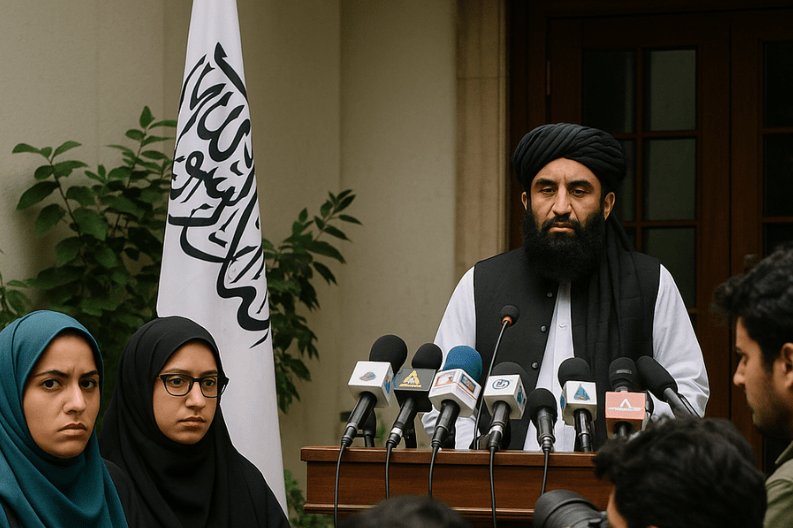A major controversy has erupted after Women journalists excluded from Taliban press conference during the visit of Afghan Foreign Minister Amir Khan Muttaqi to India. The press event took place at the Afghan Embassy in New Delhi and banned female reporters from attending. This decision sparked outrage across the media community.
The Government of India clarified on Saturday that it had no involvement in the decision. Officials from the Ministry of External Affairs (MEA) explained that the Afghan Consul General invited journalists independently. They added that the embassy operates outside India’s jurisdiction.
Reports revealed that several women journalists, despite following the dress code, were stopped from entering. This action led to heavy criticism on social media. Many journalists and activists called the move discriminatory and undemocratic. They argued that silencing women’s voices in such forums directly damages media freedom and gender equality.
Priyanka Gandhi Vadra strongly condemned the incident. She demanded an explanation from Prime Minister Narendra Modi and called the exclusion an “insult to some of India’s most competent women.” In a post on X, she asked the Prime Minister to clarify his position on the matter. She stressed that a government committed to women’s rights should never tolerate such discrimination.
The media community also expressed deep concern. The Taliban has a long history of restricting women’s rights in Afghanistan. Many journalists noted that transparency and accountability are crucial when dealing with a group known for banning women from education and jobs. The Taliban recently removed courses on Gender and Development and Human Rights from universities. They even banned books written by women.
Despite growing concerns, Muttaqi still met External Affairs Minister S. Jaishankar. They discussed trade, development aid, and stronger ties between the two nations. However, the press conference that followed was highly selective. Only 15 to 16 journalists received invitations, many just hours before the event. Ikramuddin Kamil, a Taliban official in Mumbai, personally invited selected reporters instead of sending open invitations.
This incident raises larger questions about how democratic countries should engage with regimes known for human rights abuses. By blocking women from attending, the Taliban sent a clear message about its views on gender equality, a message many nations reject.
Critics argue that excluding female reporters does more than silence them. It shapes the story and controls who gets to tell it. It also highlights the daily struggles Afghan women face. Many still fight for basic rights like education, employment, and participation in public life.
In conclusion, Women journalists excluded from Taliban press conference is more than a media access issue. It shows the ongoing global fight for women’s representation and press freedom. As debates continue, many expect democratic governments to take stronger stands, defend gender equality, and hold the Taliban accountable for its discriminatory actions.



